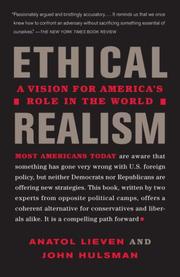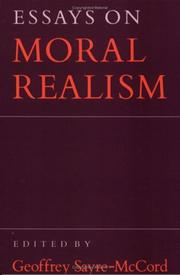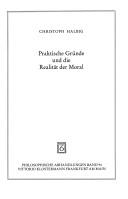| Listing 1 - 10 of 48 | << page >> |
Sort by
|

ISBN: 9780307277381 Year: 2006 Publisher: New York Vintage Books
Abstract | Keywords | Export | Availability | Bookmark
 Loading...
Loading...Choose an application
- Reference Manager
- EndNote
- RefWorks (Direct export to RefWorks)
Book
ISBN: 9782390540045 Year: 2020 Publisher: Vedrin Séma
Abstract | Keywords | Export | Availability | Bookmark
 Loading...
Loading...Choose an application
- Reference Manager
- EndNote
- RefWorks (Direct export to RefWorks)

ISBN: 0801495415 080142240X 9780801495410 Year: 1988 Publisher: Ithaca: Cornell university press,
Abstract | Keywords | Export | Availability | Bookmark
 Loading...
Loading...Choose an application
- Reference Manager
- EndNote
- RefWorks (Direct export to RefWorks)
Moral realism --- Ethics --- Realism --- Moral realism.
Book
ISBN: 3969750970 9783969750971 9783897856677 Year: 2009 Publisher: Boston : BRILL,
Abstract | Keywords | Export | Availability | Bookmark
 Loading...
Loading...Choose an application
- Reference Manager
- EndNote
- RefWorks (Direct export to RefWorks)
This book by Burkhard Radtke explores the domain of metaethics, focusing on moral realism. It aims to outline a moderate version of moral realism that aligns with significant metaethical intuitions about moral statements, which are often presented as assertions. The author seeks to demonstrate how such statements can possess truth. The book delves into the relationship between intuition and moral realism, addressing conflicting intuitions, expressivism, error theory, and subjectivism. It further discusses the challenges of open question arguments and the paradox of concept analysis. The work is intended for scholars and students in philosophy, particularly those interested in ethics and metaethics.
Moral realism. --- Metaethics. --- Moral realism --- Metaethics

ISBN: 9783465035268 Year: 2007 Volume: 94 Publisher: Frankfurt am Main Vittorio Klostermann
Abstract | Keywords | Export | Availability | Bookmark
 Loading...
Loading...Choose an application
- Reference Manager
- EndNote
- RefWorks (Direct export to RefWorks)
Moral realism --- Ethics --- Realism
Book
ISBN: 1554410452 Year: 2003 Publisher: [Place of publication not identified] : J.-M. Tremblay,
Abstract | Keywords | Export | Availability | Bookmark
 Loading...
Loading...Choose an application
- Reference Manager
- EndNote
- RefWorks (Direct export to RefWorks)
Book
ISBN: 1108580882 110870641X 1108586449 1108600425 Year: 2022 Publisher: Cambridge : Cambridge University Press,
Abstract | Keywords | Export | Availability | Bookmark
 Loading...
Loading...Choose an application
- Reference Manager
- EndNote
- RefWorks (Direct export to RefWorks)
This Element examines the many facets of ethical realism and the issues at stake in metaethical debates about it-both between realism and non-realist alternatives, and between different versions of realism itself. Starting with a minimal core characterization of ethical realism focused on claims about meaning and truth, we go on to develop a narrower and more theoretically useful conception by adding further claims about objectivity and ontological commitment. Yet even this common understanding of ethical realism captures a surprisingly heterogeneous range of views. In fact, a strong case can be made for adding several more conditions in order to arrive at a proper paradigm of realism about ethics when understood in a non-deflationary way. We then develop this more robust realism, bringing out its distinctive take on ethical objectivity and normative authority, its unique ontological commitments, and both the support for it and some challenges it faces.
Moral realism. --- Ethics --- Realism
Book
ISBN: 274926006X Year: 1998 Publisher: Toulouse, France : Érès,
Abstract | Keywords | Export | Availability | Bookmark
 Loading...
Loading...Choose an application
- Reference Manager
- EndNote
- RefWorks (Direct export to RefWorks)
Entre la chute des idéologies, le recul des religions et la complète absence de toute connotation éthique ou morale de I'économisme dominant, l'homme de la dernière modernité est en “quête de sens”. Mais fournir des indications utilisables pour bâtir une nouvelle éthique, tenant compte des caractéristiques de la modernité, implique un important travail de déblayage auquel s'attelle l'auteur, au fil des cinq tomes d'Ethique et modernité (1. Le cadre d'une nouvelle éthique ; 2. Ethique du travail et de la production ; 3. La bataille des éthiques ; 4. Athéisme et religion ; 5. Ethique du partage). LE CADRE D'UNE NOUVELLE ETHIQUE (Éthique et modernité 1) Si l'éthique est en friche, c'est avant tout que le monde et la société sont allés plus vite que la réflexion. La philosophie a été absorbée par d'autres problèmes (ontologie, épistémologie, linguistique) et la religion, par essence lente à se mouvoir, n'a pas osé s'adapter. La recherche d'une nouvelle éthique doit donc commencer par un examen de son environnement immédiat et tenir compte de nouveaux facteurs comme le travail, le profit, la communication, l'information, la vérité scientifique ainsi que de l'autonomie conquise par l'homme. Celle-ci, si elle n'est pas toujours facile à assumer, empêche |'éthique de recourir pour s'imposer aux moyens coercitifs habituels.
Book
ISBN: 9780415896740 Year: 2011 Publisher: London Routledge
Abstract | Keywords | Export | Availability | Bookmark
 Loading...
Loading...Choose an application
- Reference Manager
- EndNote
- RefWorks (Direct export to RefWorks)
Moral realism --- Phenomenology --- Aristotle.
Book
ISBN: 1498203795 9781498203791 9781498203784 1498203787 Year: 2015 Publisher: Eugene, Oregon
Abstract | Keywords | Export | Availability | Bookmark
 Loading...
Loading...Choose an application
- Reference Manager
- EndNote
- RefWorks (Direct export to RefWorks)
"Is it possible to found a Heideggerian ethic around the notion of a relationship to being (Bezug zum Seyn)? Going against much of the Western tradition, Gupta considers if the being-relationship could result in a feeling or mystical experience that is the basis of ethics. Along the way, such an affective and embodied approach to ethics brings us into dialogue with a range of thinkers, such as Kant and Schweitzer. Further, it is suggested that an environmental philosophy is consistent with a Heideggerian ethics. Finally, recent research in the neurosciences is marshaled to at least show the plausibility of Heidegger's brand of moral realism as it is developed." --
| Listing 1 - 10 of 48 | << page >> |
Sort by
|

 Search
Search Feedback
Feedback About UniCat
About UniCat  Help
Help News
News